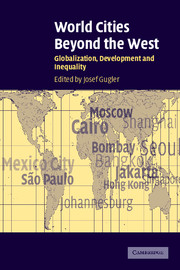Book contents
- Frontmatter
- Contents
- List of figures
- List of maps
- List of tables
- List of contributors
- Acknowledgments
- World cities beyond the West
- Introduction
- Part 1 The impact of the global political economy
- Part 2 The impact of the state
- Part 3 The impact of popular movements
- 10 São Paulo: the political and socioeconomic transformations wrought by the New Labor Movement in the city and beyond
- 11 Bombay/Mumbai: globalization, inequalities, and politics
- 12 Johannesburg: race, inequality, and urbanization
- Afterword
- Index
- References
10 - São Paulo: the political and socioeconomic transformations wrought by the New Labor Movement in the city and beyond
Published online by Cambridge University Press: 12 October 2009
- Frontmatter
- Contents
- List of figures
- List of maps
- List of tables
- List of contributors
- Acknowledgments
- World cities beyond the West
- Introduction
- Part 1 The impact of the global political economy
- Part 2 The impact of the state
- Part 3 The impact of popular movements
- 10 São Paulo: the political and socioeconomic transformations wrought by the New Labor Movement in the city and beyond
- 11 Bombay/Mumbai: globalization, inequalities, and politics
- 12 Johannesburg: race, inequality, and urbanization
- Afterword
- Index
- References
Summary
São Paulo was founded by Jesuits in 1554, on a plateau 2,493 feet (760 meters) above sea level, as a mission center for early settlers and the Indians who lived in the area. São Paulo was the first highland settlement established in Brazil, occupying the lower terraces of the Rio Tiete, in the midst of tall grasses and scattered scrub trees. The community grew very slowly and had only 300 inhabitants by the end of the sixteenth century. Seventeenth-century São Paulo was a base for expeditions (bandeiras) into the hinterland by armed explorers (bandeirantes) in search of Indian slaves, gold, silver, and diamonds. In 1560 São Paulo became a township and had a town council that could enact and enforce local laws. For a long time São Paulo remained a small town, but its location was ideal for commerce and trade, capitalizing on waterways and easy access to the sea. The sea port of Santos, even at that early time one of the most important trading routes of the country, was located only 45 miles (72 kilometers) from the new city. In 1711 São Paulo attained the status of a city, yet it remained an agrarian town.
Around 1850 São Paulo began to grow and become richer because of the highly productive coffee plantations of the state of São Paulo.
- Type
- Chapter
- Information
- World Cities beyond the WestGlobalization, Development and Inequality, pp. 299 - 327Publisher: Cambridge University PressPrint publication year: 2004
References
- 2
- Cited by



